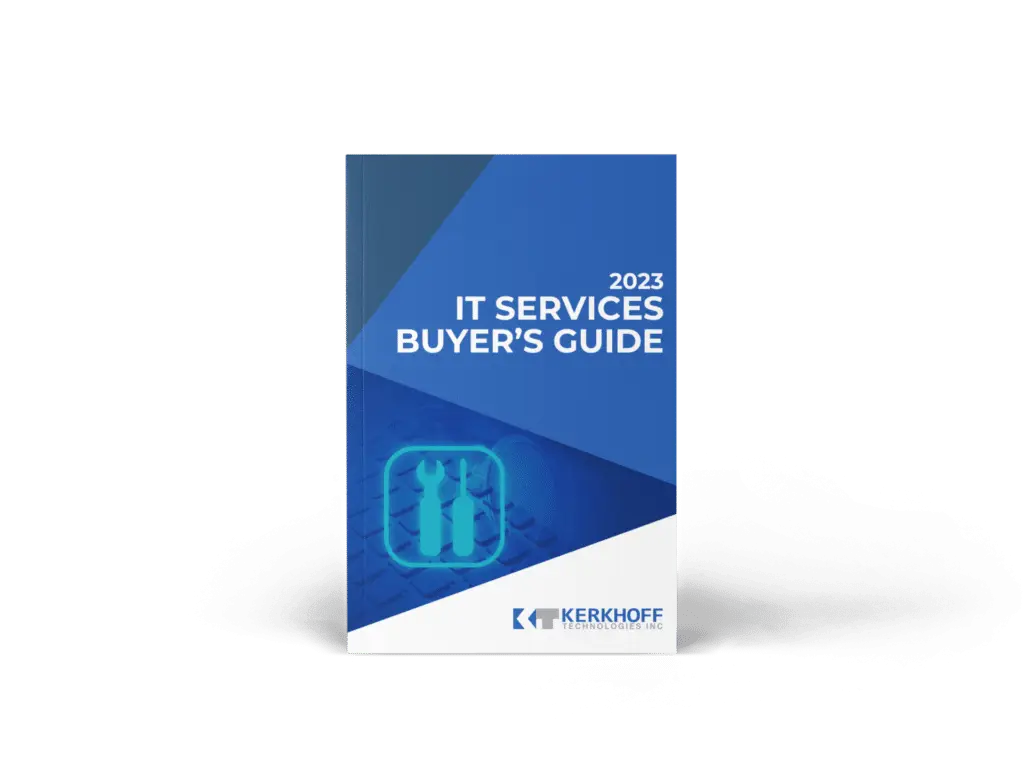
- Kerkhoff Technologies
- IT Management
- Enhance Your Server Management with These 8 Tips
Contact Us To Schedule Your Discovery Call
Follow us on Social Media

You may have state-of-the-art servers, but their efficiency can diminish over time. Managing them is key to optimizing your business operations.
Numerous organizations rely on servers for various IT functions, such as applications, emails, hosting websites, and data storage.
Although many companies have turned to cloud-based services using remote data centers, many enterprises still depend on in-house servers. As such, they need to ensure their devices remain in tip-top condition
That’s where server management comes into play.
Managing your servers can streamline the performance of your team by allowing them to complete complex tasks faster. Plus, it can enable them to detect problems early on before they get out of hand and compromise your business. As a result, the risk of experiencing operational setbacks is drastically lower.
But the only way to make the most of your server management is to perform it correctly. And to help you do so, this article will share nine tips on improving your server management.
The Eight Tips
Tip #1 – Mount the Servers Properly
Small businesses often need to prioritize immediate concerns over long-term plans because they need to work on tight budgets. This is particularly evident in terms of server management.
When you first set up your servers, it might be tempting to connect them near your workstations. However, this can harm your hardware.
Mounting your servers in racks is a much better solution. It can shield them from accidents in high-traffic areas, tripping hazards, spills, and dirt.
Furthermore, server racks can help keep the hardware safe by organizing it in an accessible area that facilitates management and cleaning. They also limit the exposure to regular wear and tear in the office.
Another critical consideration is to plan for the future when installing your servers.
When selecting a rack mount, be sure there’s enough room to expand your hardware. Unless your office is tiny, having half-empty racks is preferred to tearing them down and redesigning them a few years down the line.
Tip #2 – Separate Your Servers from Your Main Area
Depending on the type of servers, they can get quite noisy when in operation. On top of that, they can comprise valuable hardware. So, you’ll want to separate them physically from the working premises.
If you can’t afford a designated server room, invest in secure rack mounts with integrated sound reduction.
Tip #3 – Take Care of Your Hardware
Hardware maintenance plays a pivotal role in server management. Without dependable hardware, your productivity can plunge.
To avoid this scenario, you need to monitor the essential components of your server:
- CPU (Central Processing Unit) – Your CPU is the core of your servers, performing all calculations for running programs. You need to constantly monitor it to prevent overuse. If it operates near 100% of its power, your team members can’t carry out additional tasks due to slowdowns. It may require chip upgrades or performance tuning to alleviate the stress.
- RAM (Random Access Memory) – This is the working memory of your server, as it runs faster than hard disks. The more RAM you have, the higher the performance of your device. Closely monitor its usage and add more memory when it gets close to its full capacity.
- Hard drive – The hard drive is the permanent storage of your servers. It saves your data and programs, but its performance can diminish with overuse. Proper hard disk management entails keeping track of the available space, deleting unnecessary files, installing new drives, or including cloud-based solutions.
Tip #4 – Employ Frequent Cooling
You expect your servers to perform fast, but the only way to ensure this is to provide optimal conditions. That said, you should primarily focus on cooling the servers. Excess heat can dramatically decrease their lifespan.
The best practice here is to make sure your cooling device operates outside your building.
Additionally, if you experience a power outage or central air doesn’t work at night, you need a cooling solution that can run on backup power.
Tip #5 – Manage and Maintain Your Software
Software used for your server requires regular maintenance, too. The key is to perform regular updates and delete old software to enhance performance. Your servers will operate better, and there will be fewer vulnerabilities cybercriminals can exploit to access your network.
Tip #6 – Arrange the Wiring Neatly
The amount of wiring in your server setup can be overwhelming, especially if you have no technical experience. Sorting out the mess doesn’t only improve cleanliness, but it can also help boost the performance of your server viability for future upgrades.
Keep in mind that whenever you’re removing, rearranging, or installing your cables, label and group them neatly. Doing so helps prevent clutter.
Tip #7 – Pay Special Attention to Security
As previously mentioned, servers can be susceptible to cyberattacks. That’s why it’s crucial to maintain a secure system. Here’s what you should do:
- Install and update antivirus software.
- Repel unauthorized traffic with firewalls.
- Use robust access control software or sound password policies and instruct your users to change them regularly.
- Encrypt external networks and data storage.
- Incorporate SIEM (Security Information and Event Management) tools.
- Analyze and implement security logging measures to understand potential threats.
Tip #8 – Back up Your Data
The final part of robust server management is backing up your data regularly. After all, loss of information can be disastrous, harming your reputation and losing your customers.
Besides backing up server software and hardware, you should also have a backup for your power supply to prevent data losses during power outages. Moreover, you can integrate with various tools to expedite backups, recoveries, and status monitoring.
Look for software that covers both your IT architecture and operating system. It needs to work across systems and applications you currently have or plan on installing. Additionally, it should diagnose server issues efficiently with powerful analytic capabilities.
Server Management at Its Finest
Managing effective server operation involves several key considerations, from monitoring system temperature to updates and data backups. Even though this can be an arduous process, it’s integral to optimizing your server performance and eliminating security concerns.
If you need help in optimum server management in your business, we’d love to help you out. Contact us and let’s have a quick, no-obligation chat about it.
—
This Article has been Republished with Permission from The Technology Press.
Do You Need a New IT Support Partner?
Is your business reliant on technology? Don’t wait for a technical issue to occur before finding a great IT support partner.
Download our free guide to choose the right one for you.

- Kerkhoff Technologies
- IT Management
- Enhance Your Server Management with These 8 Tips
Contact Us To Schedule Your Discovery Call
Follow us on Social Media

As we step into the joyful holiday season – with cozy get-togethers, sparkling lights, and shared happiness – Kerkhoff Technologies is thrilled to be by your side, ensuring your online experience is safe and smooth. To keep things simple and secure during this festive time, we’ve gathered some essential tech tips.
These easy-to-follow suggestions will not only make your digital life better but also let you fully enjoy the magic of the holidays!
Let’s check out some must-know tech tips that will help you stay safe online and focus on the joy of the season:
- Update Your Devices: The holiday season is the perfect time to ensure all your devices, from smartphones to computers and smart gadgets, are running the latest software updates. This guarantees optimal performance and security.
- Backup Your Data: Before the holiday rush kicks in, take a moment to back up your essential data. This simple step can be a lifesaver, protecting you against potential data loss in unforeseen circumstances.
- Secure Your Passwords: Strengthen your online security by updating passwords for your various online accounts. Where possible, enable two-factor authentication for that extra layer of protection.
- Be Wary of Phishing Scams: ‘Tis the season for phishing scams. Exercise caution with unexpected emails, especially those requesting personal information or payment details. When in doubt, verify the source.
- Check Your Privacy Settings: Heading out for the holidays? Review and update your social media privacy settings to ensure you’re comfortable with what you’re sharing, especially if you’re away from home.
- Protect Your Home Network: If you’re hitting the road, make sure your home network is secure. Update your router’s firmware and use a robust, unique password to keep your digital fortress strong.
- Set up Out-of-Office Responses: Taking a break from work? Set up out-of-office email responses. Not only does this inform people of your absence, but it also serves as a deterrent against potential phishing attempts.
- Monitor Your Accounts: Keep a watchful eye on your bank and credit card accounts for any suspicious activity. Many financial institutions offer mobile apps to make this task quick and easy.
- Charge Your Devices Safely: Steer clear of public charging stations, which can be vulnerable to malware. Carry your charger or use a portable power bank to ensure a secure power-up.
- Educate Family Members: If you’re the tech-savvy member of your family, take a moment to share some online safety tips, especially if there are new devices in the mix this holiday season.
- Clean Up Your Inbox: Unsubscribe from newsletters and promotional emails you no longer need. A cleaner inbox can help you spot important emails more easily.
- Check Your Travel Apps: If you’re traveling, make sure travel apps, such as navigation and accommodation apps, are updated and working properly.
- Holiday Scams Awareness: Be cautious of holiday-specific scams like fake charities or fraudulent deals. Verify the authenticity of websites before making online purchases.
- Mindful Social Media Sharing: Enjoy sharing holiday moments but be cautious about sharing real-time travel plans to avoid potential security risks.
- Quality Family Time: Encourage everyone to disconnect from devices during family time and savor the holidays without constant digital distractions.
Do You Need a New IT Support Partner?
Is your business reliant on technology? Don’t wait for a technical issue to occur before finding a great IT support partner.
Download our free guide to choose the right one for you.




